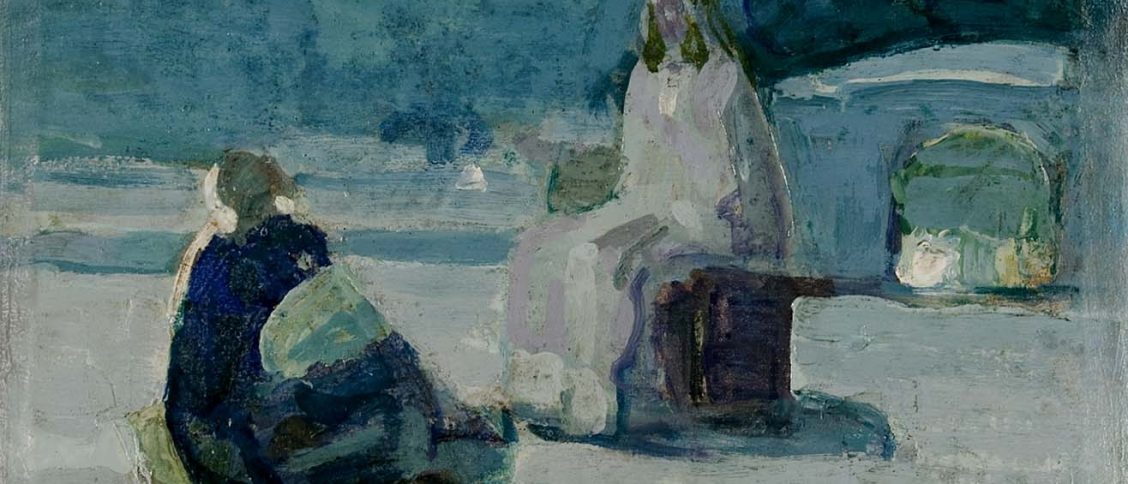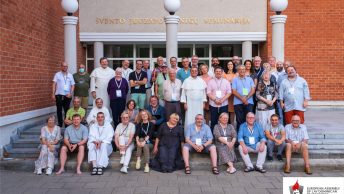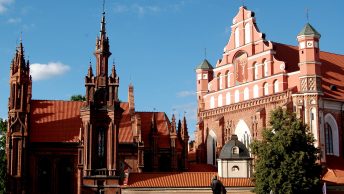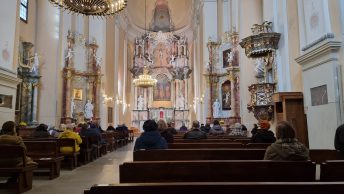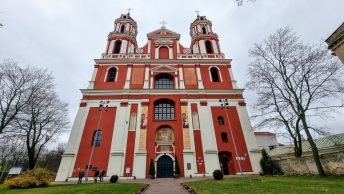🇪🇸 Versión en español a continuación
Reflection for the fourth Sunday of Lent 2021
God so loved the world that He gave his only Son.
Jn 3:16
The fourth Sunday of Lent is called Laetare Sunday. “Laetare” means “rejoice”, and the Church exalts us to rejoice in the hope of our salvation: “Rejoice, Jerusalem! Be glad for her, you who love her; rejoice with her, you who mourned for her” (Entrance Antiphon — Isaiah 66:10-11). On this “Rejoice!” Sunday, we can reflect on what brings us love in life.
This is precisely what John explains to us: God is love, and His love for us sinful humanity is constant, generous, and self-sacrificing. Jesus truly loves us, despite our being sinful, that He is willing to suffer and die for us, because His compassion is the most precise expression of love. Jesus said, “I am the way … no one can come to the Father except through me”. He created us out of love and He desires to be in a personal relationship with us.
God has always loved us, but the people of God “were unfaithful; they defiled the temple; and, they laughed at the prophets”, as we read in the Book of Chronicles., God did not abandon them, but he made some unexpected decisions: This led to their deportation and exile in Babylonia. However, in his mercy, God decided to restore them at his own time – when the people had had enough time to reflect on what they had done and realize their mistakes. One pagan king, Nebuchadnezzar II, took them into captivity, and another pagan king, Cyrus, released them from captivity. This is a demonstration of how God used even one pagan King to save his people from Babylonian captivity. God works through Cyrus of Persia to rebuild the Temple in Jerusalem and through the prophets He announced the arrival of the Messiah who will save his People.
In our Second Reading, Saint Paul speaks to us of the love of God. He reminds us that God is rich in grace and mercy for us because “when we were dead through sin, He brought us to life with Christ”, and invites us “to live a good life, as He meant us to live it from the beginning.” This salvation is a free gift given to us by God. God’s grace makes it possible for us, but we also must work to maintain that relationship because fate and works (charity) must go together. Jesus expects us to do something more: Not everyone who says to me, ‘Lord, Lord,’ will enter the kingdom of heaven, but only the one who does the will of my Father in heaven. (Matt 7:21) It means that we need to live our faith, not just believe, and this is the Tradition of the Church.
In the Gospel of John we can see a “secret” conversation, which happens at night, between Jesus and Nicodemus. Jesus speaks to Nicodemus who belonged to the Sanhedrin, of the need to experience the presence of God and to offer oneself to God. Lent is the time we have to look to Jesus and his sacrifice on the cross. And «Why was Jesus crucified?» We can read today in the Gospel: «As Moses lifted up the serpent in the wilderness, so must the Son of Man be lifted up» (Jn 3:14). What does the lifted-up serpent have in itself, and why must the Son of Man be lifted up in this way?
Jesus himself refers to Nicodemus in what is written in the book of Numbers (Num. 21: 8): The Israelites who walked in the wilderness were bitten by snakes and were healed if they looked upon the image of the snake that Moses had raised. Jesus uses that image of Moses and the serpent to speak of his own death on the cross and the salvation that comes from God through him. It is an invitation to bring our darkness into the healing light of the cross. Jesus is the light of the world, but sometimes we preferred darkness to light. Saint John offers us examples in his Gospel of light and darkness, belief, and unbelief, good and evil, salvation and condemnation, because we are in constant struggle, because of our human weakness. We were saved from death because Logos became one of us and our sins may be forgiven on the cross. Lent is an opportunity to put the cross of the Lord Jesus Christ before us and to renew our faithfulness to our God and Saviour in this pandemic time. Let us remember this Sunday especially those who are in hospital beds, health care workers and all the people affected by the pandemic. Let us believe in the love of God, which in Christ was not an empty word, but a true act and sign, a true power that heals us, “so that everyone who believes in Him may have Eternal life.”
Maro Botica OP
Tanto amó Dios al mundo que dio a su único Hijo.
Jn 3:16
El cuarto domingo de Cuaresma se llama Domingo de Laetare. “Laetare” significa “regocíjate”, y la Iglesia nos exalta para regocijarnos en la esperanza de nuestra salvación: “Festejad a Jerusalén, gozad con ella, todos los que la amáis, alegraos de su alegría, los que por ella llevasteis luto” (Antífona de entrada – Isaías 66: 10-11). En este «¡Regocíjate!» El domingo, podemos reflexionar sobre lo que nos trae el amor en la vida.
Esto es precisamente lo que Juan nos explica: Dios es amor, y su amor por nosotros, por la humanidad pecadora es constante, generoso y abnegado. Jesús nos ama de verdad, a pesar de que somos pecadores, tanto que está dispuesto a sufrir y morir por nosotros, y su compasión es la expresión más precisa de ese amor. Jesús dijo: «Yo soy el camino … nadie puede venir al Padre si no por mí». Él nos creó por amor y desea tener una relación personal con nosotros.
Dios siempre nos ha amado, pero el pueblo de Dios: “fue infiel; profanó el templo; y se burló de los profetas”, como podemos leer en el libro de Crónicas. Dios no los abandonó, pero tomó algunas decisiones inesperadas: esto los llevó a su deportación y al exilio de Babilonia. Sin embargo, en su misericordia, Dios decidió restaurarlos a su debido tiempo, cuando la gente había tenido suficiente tiempo para reflexionar sobre lo que habían hecho y corregir sus errores. Un rey pagano, Nabucodonosor II, los llevó al cautiverio, y otro rey pagano, Ciro, los liberó del cautiverio. Esta es una demostración de cómo Dios usó incluso a un rey pagano para salvar a su pueblo del cautiverio babilónico. Dios obra a través de Ciro de Persia para reconstruir el Templo en Jerusalén y, a través de los profetas, anunció la llegada del Mesías que salvará a su Pueblo.
También en la segunda lectura San Pablo nos habla del amor de Dios. Nos recuerda que Dios es rico en gracia y misericordia para nosotros porque “cuando estábamos muertos por el pecado, nos resucitó con Cristo”, y nos invita a “vivir una buena vida, como quiso que la viviéramos desde el principio…» Esta salvación es un regalo gratuito que nos ha dado Dios. La gracia de Dios la hace posible para nosotros, pero también debemos trabajar para mantener esa relación porque el destino y las obras (caridad) deben ir de la mano. Jesús espera que hagamos algo más: no todo el que me dice «Señor, Señor» entrará en el reino de los cielos, sino el que hace la voluntad de mi Padre que está en el cielo. (Mateo 7:21) Significa que debemos vivir nuestra fe, no solo creer, y esta es la Sagrada Tradición de la Iglesia.
En el Evangelio podemos ver una conversación “secreta”, que ocurre de noche, entre Jesús y Nicodemo. Jesús habla a Nicodemo, miembro del Sanedrín, de la necesidad de experimentar la presencia de Dios y de ofrecerse a Él. La Cuaresma es el tiempo que tenemos para mirar a Jesús y su sacrificio en la cruz. Y «¿Por qué fue crucificado Jesús?» Hoy podemos leer en el Evangelio: «Como Moisés levantó la serpiente en el desierto, así es necesario que el Hijo del Hombre sea levantado» (Jn 3, 14). ¿Qué tiene la serpiente levantada en sí misma, y por qué el Hijo del Hombre debe ser levantado de esta manera?
Jesús mismo se refiere a Nicodemo en lo que está escrito en el libro de números (Núm. 21: 8): Los israelitas que caminaban por el desierto eran mordidos por serpientes y sanaban si miraban la imagen de la serpiente que Moisés había levantado. Jesús usa esa imagen de Moisés y la serpiente para hablar de su propia muerte en la cruz y la salvación que viene de Dios a través de Él. Es una invitación para llevar nuestras tinieblas su luz sanadora de la cruz. Jesús es la luz del mundo, pero a veces preferimos las tinieblas a la luz. San Juan nos ofrece varios ejemplos en su Evangelio de luz y oscuridad, fe e incredulidad, bien y mal, salvación y condenación, porque estamos en constante lucha, por nuestra debilidad humana. Fuimos salvados de la muerte porque el Logos se convirtió en uno de nosotros para que nuestros pecados puedan ser perdonados en la cruz. La Cuaresma es una oportunidad para poner la cruz de Jesucristo ante nosotros y renovar nuestra fidelidad a nuestro Dios y Salvador en este tiempo de pandemia. Recordemos este domingo especialmente a los que se encuentran hospitalizados, los trabajadores sanitarios y todas las personas afectadas por la pandemia. Creamos en el amor de Dios, que en Cristo no fue una palabra vacía, sino un acto y un signo verdaderos, el verdadero poder que nos sana, “para que todo el que crea en Él tenga vida eterna”.
Maro Botica OP

